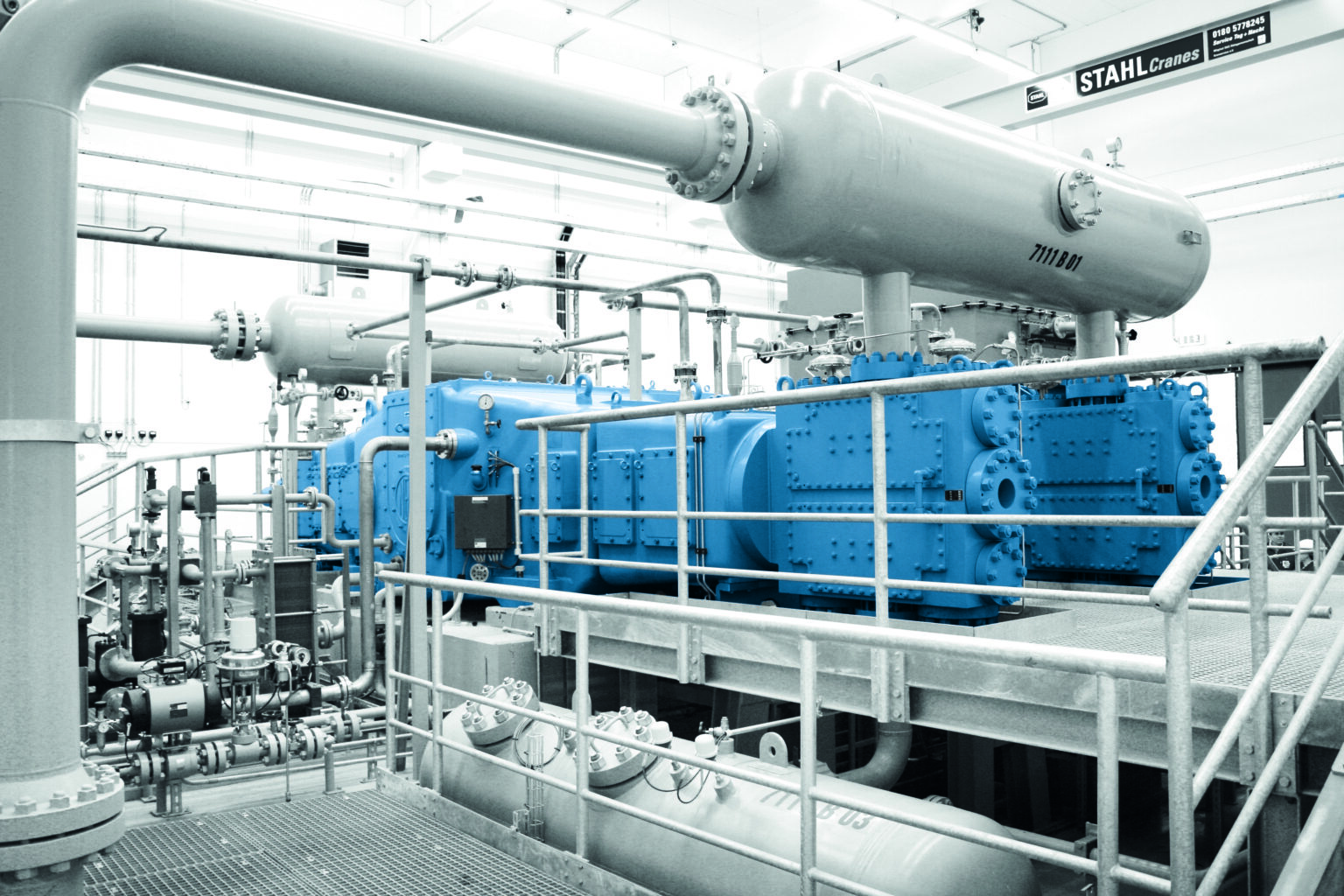- Type of hydrogen compressors
- Use cases
- The role of hydrogen gas compressor in a refueling station
- The role of compressor for hydrogen in an electrolyser
- Hydrogen compressors in a hydrogen storage system
- Performance criteria
- Interaction with other components or subsystems in a hydrogen system
- Technical attributes
- Efficiency
Browse hydrogen compressors from leading suppliers on our marketplace!
A hydrogen compressor is a mechanical device that is used to increase the pressure of hydrogen gas. The working principle of such a hydrogen gas compressor is based on the fact that as the pressure of a gas increases, the volume of the gas decreases. This means that by compressing the hydrogen gas, it is possible to store more of the gas in a smaller volume.
Type of hydrogen compressors
There are six different type of hydrogen compressors that are widely used in the hydrogen economy.
- Reciprocating compressors: In a reciprocating hydrogen compressor, a piston or plunger compresses the hydrogen gas. As the piston or plunger moves back and forth, it increases the pressure of the hydrogen gas by reducing its volume. A reciprocating hydrogen compressor is typically used for low- to medium-pressure applications and are known for their high efficiency and durability.
- Centrifugal compressors: In a centrifugal hydrogen compressor, a spinning impeller compresses the hydrogen gas. As the impeller spins, it generates a high-velocity flow of hydrogen gas, which is then converted into pressure by a diffuser. Where a small hydrogen compressor is needed, the centrifugal type is preferred. It is typically used when a high pressure hydrogen compressor is required and it is known for high flow rates and compact size.
- Diaphragm compressors: Diaphragm compressors use a flexible membrane or diaphragm to compress the hydrogen gas. As the diaphragm moves back and forth, it increases the pressure of the hydrogen gas by reducing its volume. Diaphragm compressors are typically used for low-pressure applications and are known for their low noise and vibration levels.
- Scroll compressors: Scroll compressors use two interleaved scrolls to compress the hydrogen gas. As the scrolls rotate, they trap and compress pockets of the hydrogen gas, increasing its pressure. Scroll compressors are typically used for low- to medium-pressure applications and are known for their high efficiency and compact size.
- Cryogenic hydrogen compressor: This type of compressor is of special interest for hydrogen mobility solutions, involving liquefaction of hydrogen down to very low temperatures in order to be stored at 350 or 700 bar.
- Electrochemical hydrogen compressor: These type of compressors are the newest type of compressors in which hydrogen gas compressed using electricity. This kind of compressor uses an electrolysis procedure to separate the hydrogen and oxygen atoms from the water molecules, and then it compresses the hydrogen gas to a high-pressure state for storage or transit. The electrochemical hydrogen compressors are still in their research and development phase but are most suitable to be primarily used in PEM fuel cells.

Example – reciprocating compressor
Use cases
Hydrogen compressors are one of the key component in the hydrogen industry with several use cases in the hydrogen economy.
- Hydrogen refueling stations: Hydrogen compressors are used in hydrogen refueling stations to compress the hydrogen gas to the required pressure for dispensing to fuel cell vehicles. As a result, this type of installation is often also referred to as a hydrogen compressor station.
- Hydrogen production: Hydrogen compressors may be used in hydrogen production systems, such as electrolysers, to compress the hydrogen gas produced by the electrolysis process to the required pressure for storage or distribution.
- Hydrogen storage: A compressor for hydrogen may be used in hydrogen storage systems to compress the hydrogen gas to the required pressure for storage. This can improve the storage capacity and safety of the system.
- Fuel cell systems: Especially small hydrogen compressors may be used in fuel cell systems to compress the hydrogen gas to the required pressure for the fuel cell stack. This can improve the performance and efficiency of the fuel cell system.
- Industrial applications: Hydrogen compressors may be used in a variety of industrial applications, such as hydrogenation, chemical processing, and petroleum refining, to compress the hydrogen gas to the required pressure for these processes.
The role of hydrogen gas compressor in a refueling station
In a hydrogen refueling system, the role of the hydrogen compressor is to compress the hydrogen gas to the required pressure for dispensing to vehicles. This may involve compressing the hydrogen gas to pressures ranging from 350 to 700 bar, depending on the specific requirements of the refueling system. The compressor for hydrogen in a refueling system may also be responsible for filtering and purifying the hydrogen gas to remove impurities and contaminants that could affect the performance of fuel cell vehicles.
The role of compressor for hydrogen in an electrolyser
Hydrogen compressor is one of the important component in an electrolyser as it is used to compress the hydrogen gas produced by the electrolysis process to the required pressure for storage or distribution. This may involve compressing the hydrogen gas to pressures ranging from 5 to 10 bar, depending on the specific requirements of the electrolyser.
Hydrogen compressors in a hydrogen storage system
A hydrogen compressor may be needed in a hydrogen storage system if the hydrogen gas is to be stored at a pressure that is higher than the ambient pressure. In this case, the compressor is used to compress the hydrogen gas to the required pressure for storage. But in addition to this, there are several other factors that may play a role in using the hydrogen compressors in hydrogen storage systems.
- Increased storage capacity: By compressing the hydrogen gas to a higher pressure, it is possible to store more hydrogen in a given volume. This can be useful in applications where space is limited or where it is desirable to maximize the amount of hydrogen that can be stored.
- Improved safety: Storing hydrogen at a higher pressure can improve the safety of the storage system by reducing the risk of hydrogen leakage or escape.
- Ease of handling: Compressing the hydrogen gas to a higher pressure can make it easier to handle and transport, as it can be stored in smaller, more portable containers.
Performance criteria
There are six key performance parameters of a hydrogen compression systems.
- Efficiency: The efficiency of a hydrogen compressor refers to the amount of energy that is required to compress the hydrogen gas. Higher-efficiency compressors use less energy to compress the gas, which can lead to cost savings and reduced greenhouse gas emissions.
- Reliability: Reliability is an important performance criterion for hydrogen compressors, as they are often used in critical applications where downtime can be costly. Reliable hydrogen compressors are able to operate continuously without failure for long periods of time.
- Durability: Durability is another important performance criterion for hydrogen compressors, as they may be subjected to harsh operating conditions such as high temperatures and pressures.
- Flow rate: The flow rate of a hydrogen compressor refers to the amount of hydrogen gas that can be compressed in a given period of time. Higher flow rate compressors are able to compress more gas per unit of time, which can be useful in applications where high gas flow rates are required.
- Pressure: The pressure of a compressor for hydrogen refers to the amount of force that is applied to the hydrogen gas during the compression process. Higher-pressure compressors are able to compress the hydrogen gas to higher pressures, which can be useful in applications where high-pressure gas is required.
- Power consumption: The power consumption of a hydrogen compressor refers to the amount of energy that is required to operate the compressor. Lower power consumption compressors are more efficient and cost-effective to operate.
Interaction with other components or subsystems in a hydrogen system
Hydrogen compressors typically have several key interfaces with other components or subsystems in a hydrogen system.
- Inlet and outlet connections: Hydrogen compressors typically have inlet and outlet connections that allow the gas to flow into and out of the compressor. These connections may be equipped with valves, filters, or other flow control devices to regulate the flow of gas.
- Control systems: Hydrogen compressors may be connected to control systems that monitor and regulate the performance of the compressor. These systems may include sensors, actuators, and other components that help to optimize the operation of the compressor.
- Safety systems: Hydrogen compressors may be connected to safety systems that help to ensure the safe and reliable operation of the compressor. These systems may include pressure relief valves, explosion-proof enclosures, and other safety features.
Technical attributes
There are several technical attributes that may be considered when purchasing and integrating a hydrogen compressor, including:
- Pressure range: The pressure range of a hydrogen compressor refers to the range of pressures that the compressor is capable of handling. It is important to select a compressor with a pressure range that is suitable for the specific application.
- Flow rate: The flow rate of a hydrogen compressor refers to the amount of hydrogen gas that can be compressed in a given period of time. It is important to select a compressor with a flow rate that is suitable for the specific application.
- Efficiency: The efficiency of a compressor for hydrogen refers to the amount of energy that is required to compress the hydrogen gas. It is important to select a compressor with high efficiency to minimize energy consumption and costs.
- Reliability: Reliability is an important attribute to consider when purchasing hydrogen compressor systems, as it can affect the overall performance and safety of the system. It is important to select a compressor that has a proven track record of reliability.
- Durability: Durability is another important attribute to consider when purchasing a hydrogen compressor, as it can affect the long-term performance and lifespan of the compressor. It is important to select a compressor that is built to withstand the harsh operating conditions that may be encountered in a hydrogen system.
- Size and weight: The size and weight of a hydrogen compressor may be important considerations depending on the specific application. It is important to select a compressor that is suitable for the available space and weight requirements.
- Cost: The cost of a compressor for hydrogen may be a key consideration for some applications. It is important to carefully evaluate the trade-offs between cost and performance when selecting a compressor.
Efficiency
Hydrogen compressor efficiency is typically measured by dividing the output power of the compressor (the power required to compress the hydrogen gas) by the input power of the compressor (the power required to operate the compressor). This ratio is expressed as a percentage, with higher percentages indicating higher efficiency.
There are several factors that can affect the efficiency of a compressor for hydrogen, including the design of the compressor, the operating conditions, and the quality of the hydrogen gas. It is important to carefully consider these factors when selecting and operating a hydrogen compressor in order to maximize efficiency.
Last update: 26.01.2023




